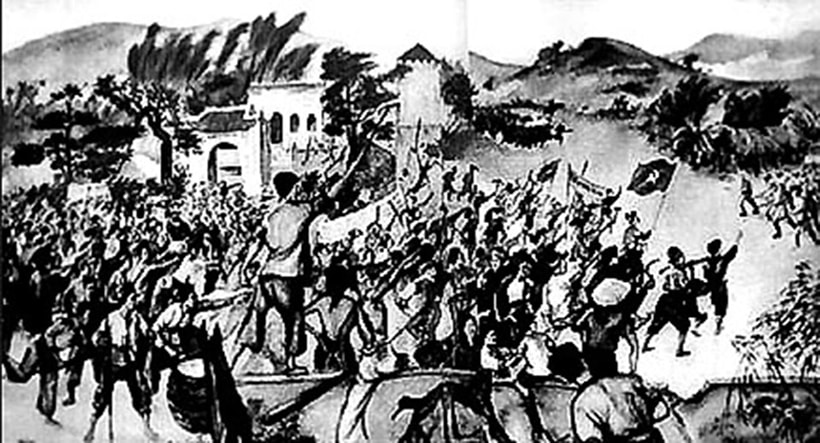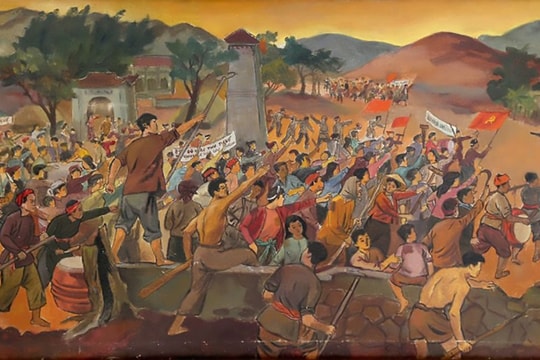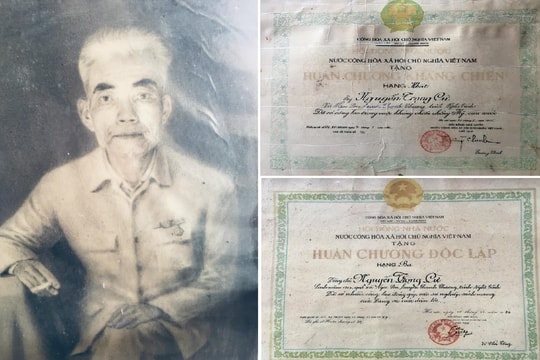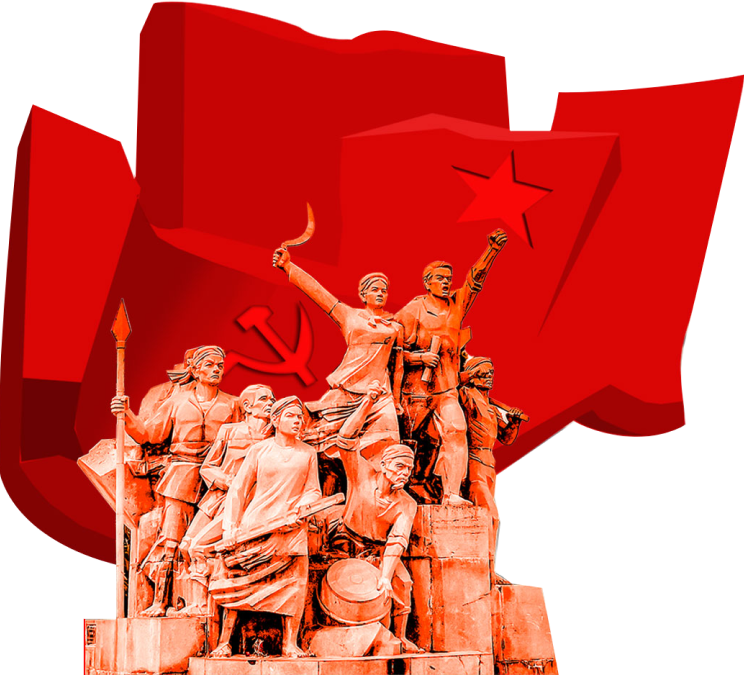Comrade Le Ngan's contributions to the Nghe Tinh Soviet movement in Nghi Xuan (Ha Tinh)
Witnessing the miserable life due to the brutal oppression and exploitation of the imperialist and feudal regime, Le Ngan soon formed the ideology of nurturing great ambitions to fight for revolution with the people...
Ancient Tien Cau (now Xuan Giang commune) - the central land located on the poetic Lam river in Nghi Xuan district, Ha Tinh province. This place is considered the land of "Long Trung Lac" so it was chosen by many politicians and military leaders such as: Uy Minh Vuong Ly Nhat Quang when he was assigned to guard Hoan Chau, or Deputy An Sat Giao Chi concurrently Tri Phu Nghe An to set up headquarters... Therefore, generations of Xuan Giang children always promote the tradition of patriotism, actively participate in battles against invaders, and protect the Fatherland's borders.
Comrade Le Ngan (alias Kim Cuu) was born in 1910, in a poor peasant family in Tien Cau village, Xuan Vien commune (now Xuan Giang commune), Nghi Xuan district, Ha Tinh province. As the only son in a family of 3 sisters, his parents died early, at the age of 10 Le Ngan had to work as a hired hand everywhere... Every day, having to witness the scene of people who were hard-working, patient, and industrious but still had miserable lives due to the brutal oppression and exploitation of imperialism and feudalism, Le Ngan soon formed the idea of nurturing a great ambition to make a revolution to save the people and the country.

After the Phuc Viet Association was founded in 1925, comrade Le Ngan was enlightened and actively participated in local movements such as rallies, demonstrations, leaflet distribution, etc.
At the end of March 1930, comrade Tran Huu Thieu, on behalf of the Ha Tinh Provisional Provincial Party Committee, went to Nghi Xuan to organize the Conference to establish the Nghi Xuan District Party Committee. After its establishment, the District Party Committee paid great attention to Party development. In July 1930, Tien Cau village established a Party cell, with active patriotic activities from before. Comrade Le Ngan was admitted to the Party and participated in Tien Cau Party Cell with comrades Dang Tao, Bui Chuc, Le Dao, Nguyen Hoc Lan and Tran Dinh Luyen, with comrade Tran Dinh Luyen as Secretary.
The Party cell paid special attention to propaganda and education of the masses through such forms as: mass meetings with organizations, organizing rallies in the whole commune, disseminating the Party's guidelines and policies, distributing leaflets, hanging hammer and sickle flags at the top of Thong mountain... Therefore, the revolutionary movement in Tien Cau spread more and more widely and grew higher. Organizations such as Farmers' Association, Red Self-Defense Force, Red Relief Association, Women's Liberation Association... were soon established.
Under the direction of the Party Cell, the whole commune launched a movement to fight for the reduction of high taxes and against oppression and exploitation.... The movement took place vigorously and widely, with the typical example being the struggle and demonstration on August 1, 1930. Following the general policy of the whole district, the Tien Cau Party Cell mobilized the masses of the whole commune to participate in the rally to celebrate the International Day against War and support the struggle movement of Vinh - Ben Thuy workers.
From dawn, under the direct leadership of comrade Tran Dinh Luyen - Party cell secretary, comrade Le Ngan, together with the people of Tien Cau, Ta Ao, and Uy Vien villages, gathered in neat ranks at Bai Rong (Xuan Hoa) to attend the ceremony. The rally attracted more than 500 people and party members to participate with banners, drums, and loud slogans:
- Oppose imperialism and war!
- Land for farmers, factories for workers!
- 8 hour work day, high tax and duty reduction!
- Protest against white terror…
After listening to the speech, the masses divided into groups to march and demonstrate their power in the communes. The rally lasted for hours and was considered the opening demonstration of the revolutionary movement of 1930-1931 in Nghi Xuan.
Imbued with the Party's guidelines, the revolutionary movement in Tien Cau grew stronger each day, the mass forces were expanded and strengthened, activities such as opening classes to teach the national language, reading books, Party newspapers... increased. In the whole district, 22/23 villages and communes organized rallies, demonstrations and fought against the local tyrants during the year-end tax collection season.
In order to suppress the strong struggle movement of the people, the French colonialists intensified their search and repression. In that situation, the District Party Committee decided to withdraw some party members to work secretly in Can Loc and send some comrades to study culture...
In early December 1930, comrade Le Ngan was sent by the District Party Committee to attend a cultural class in Can Loc, consisting of 15 members, for a period of 3 months, headed by teacher Dinh Long (District Party Committee Executive Committee). After completing the course, he was trusted by the District Party Committee to be in charge of the communes including: Tien Cau, Xuan Vien, Ta Ao.
With enthusiasm and overcoming all difficulties, comrade Le Ngan went to villages and communes to propagate and mobilize the masses to participate in rallies and demonstrations about the suffering caused by French colonialism, thereby promoting the district-wide movement to demand the reduction of high taxes and heavy duties...
On May 1, 1931, joining the struggle of the people of the districts to protest against the white terror of the French colonialists and their henchmen, under the direction of the Tien Cau Party Cell, comrade Le Ngan and the people of Tien Cau village joined the crowd of people from 3 communes (Co Dam, Phan Xa, Dan Hai) gathered at Co Lam Camp and together marched to the district capital, shouting slogans as they walked.
Faced with the strong fighting spirit of the revolutionary masses, the local mandarins, bandits, and porters did not dare to act. District chief Nguyen Viet Khang panicked and took the bronze seals, books, and money and fled... The struggle was successful, with a large scale, tightly organized, and achieved many victories of great significance, creating conditions for the Red Agricultural Association (also known as the Commune Agricultural Committee, Village Agricultural Committee) to lead the people.
From the end of 1931, the local revolutionary movement began to enter a very difficult period, the villages of Tien Cau, Ta Ao, Xuan Vien were considered by the enemy as "rebellious" and "stubborn" places. Implementing new terrorist policies, with a very intense campaign to hunt down Party cadres, they sent soldiers to burn down the house of comrade Tran Dinh Luyen - Secretary of Tien Cau Party Cell, demolish temples, pagodas, looted properties, secretly surrounded the District Party Committee, shot dead comrade Le Duy Dai - Secretary of the District Party Committee, and broke the leg of comrade Tran Hoanh - District Party Committee member.
Comrades Le Ngan, Phan Nam Tuyet, Le Nhan Tong, and Nguyen Nhu Cuong were arrested while discussing plans to reorganize the Party and stir up a movement. They were taken to the District Office and tortured for three months with all kinds of torture and interrogation by the enemy, but they remained steadfast, only answering "I don't know!". Unable to extract any information, the French colonialists and the Ha Tinh Southern Court exiled Le Ngan to Quang Nam Prison. While in the imperialist prison, he always upheld the integrity of a communist, established contacts, participated in the prison cell, and was an active member in movements to fight against the harsh regime of the colonial prison.
In early 1939, comrade Le Ngan and a number of Nghi Xuan party members were released and returned to their hometown to continue their revolutionary activities in the locality, such as distributing leaflets, holding rallies, demonstrating, etc.
In early 1940, comrade Le Ngan was arrested by the enemy for the second time and exiled to Buon Ma Thuot Prison with 40 others.
During his years in prison, comrade Le Ngan always maintained the spirit and will of a communist soldier, with a steadfast belief in the revolutionary cause led by the Party.
In May 1945, comrade Le Ngan and other communist comrades imprisoned in prisons across the country were released one after another. After being released from prison and sent to Khanh Hoa province to work, comrade Le Ngan sought to establish contact with comrade Nguyen Van Chi (from Khanh Hoa - fellow prisoner) and Bui Duc Giao (Thach Ha), Ngo Duc De (Can Loc) to join the Viet Minh Leadership Committee, directly mobilizing the people to fight for power.
When the country gained independence, comrade Le Ngan was elected to the Executive Committee of Vinh Xuong district, Khanh Hoa province. He continued to return to rural areas and actively participated in revolutionary activities, mobilizing the masses to participate in establishing the Viet Minh Front Committee.
In 1947, comrade Le Ngan was able to return to his hometown to continue his revolutionary activities in the locality...
-----
REFERENCES:
- Nghi Xuan District Historical Records Book, Ha Tinh Publishing House, 1971.
- Book of LSDB of Xuan Giang commune, Publishing House - Hanoi 2015.
- Memoirs of Comrade Le Ngan (preserved at the XVNT Museum)


.jpg)

.jpg)


